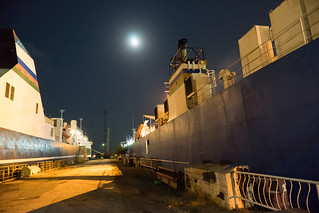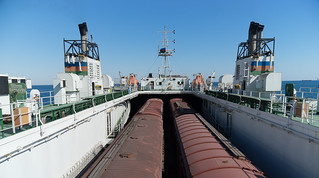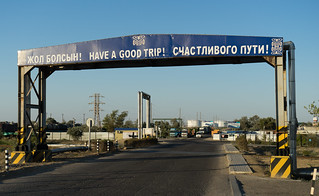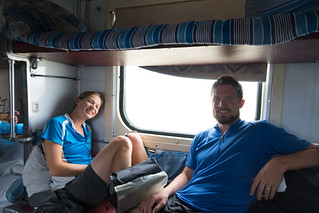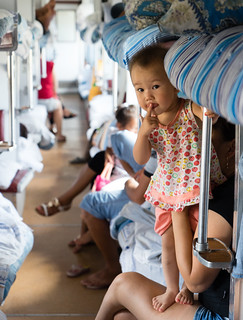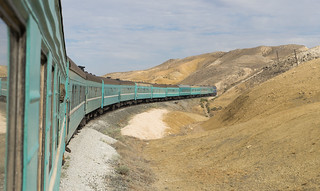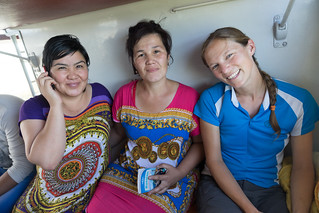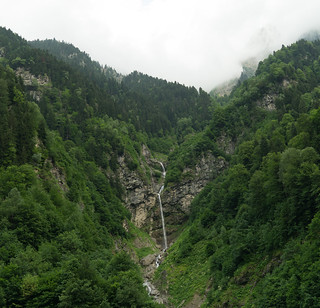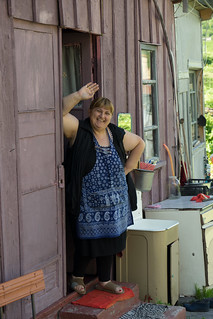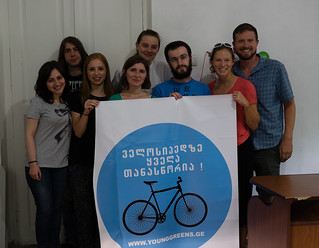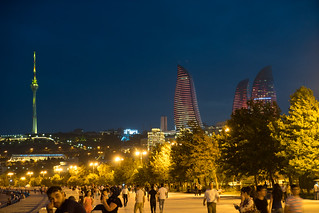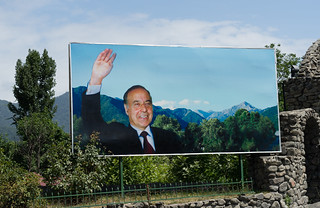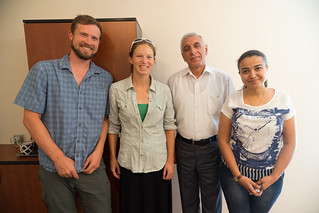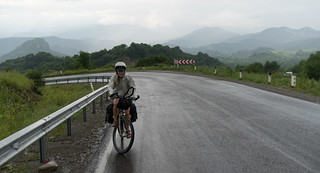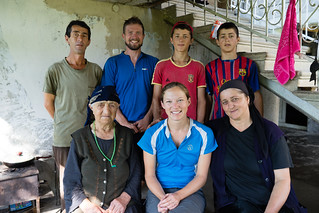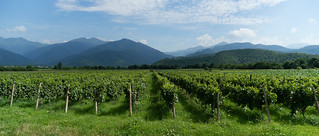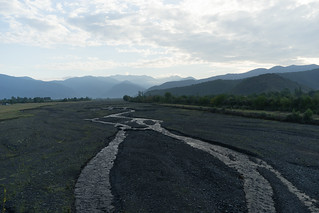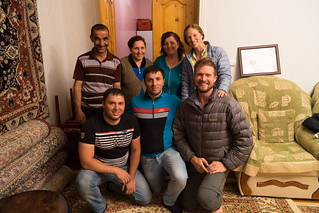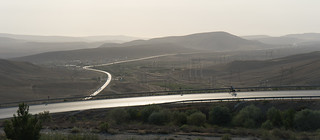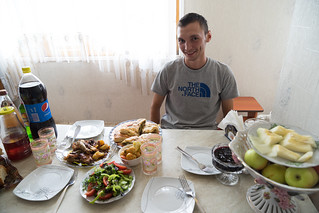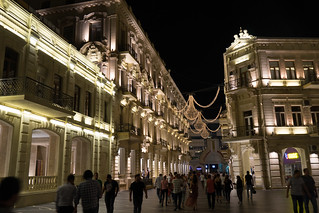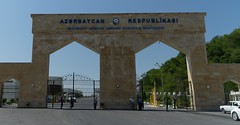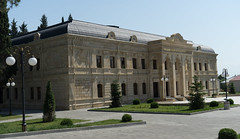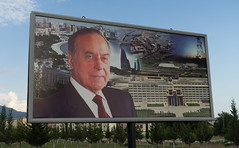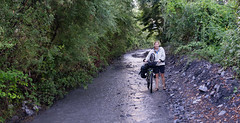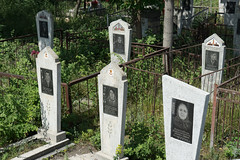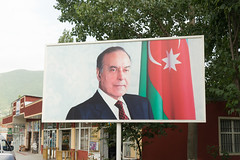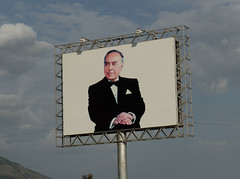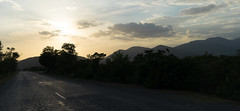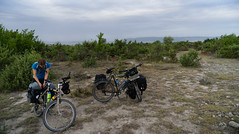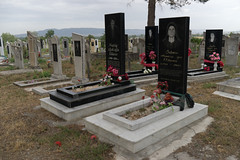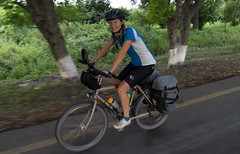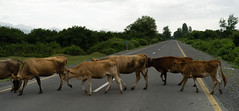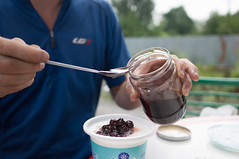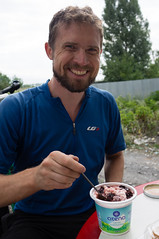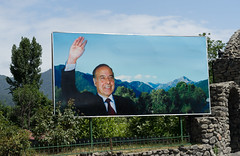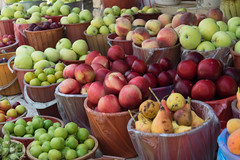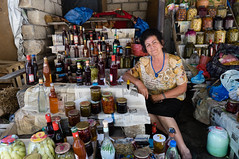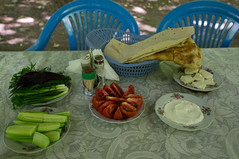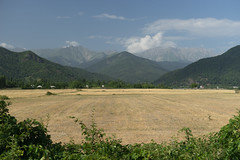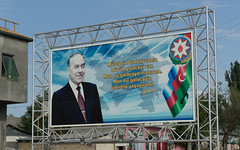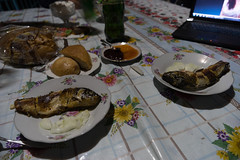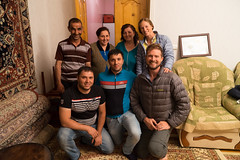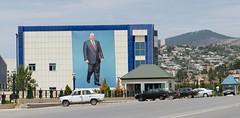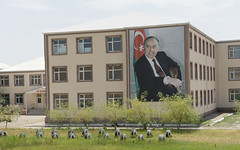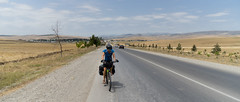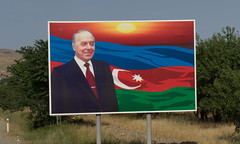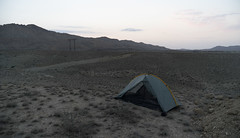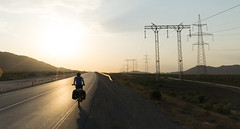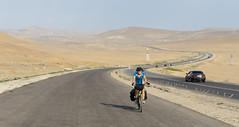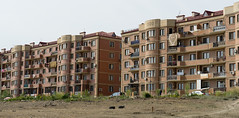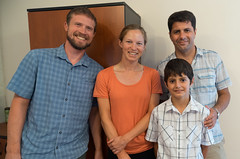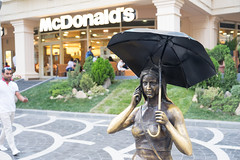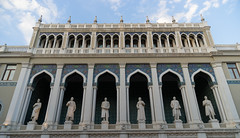We left our home in Baku at 11PM and took one last trip through the Old City before biking to the Port. There, we went through a quick customs process and were pointed towards the ship. It was completely dark and there was no obvious place to board with our bikes, but a few men stepped out of the shadows and pointed the way – which involved hopping over a wide gap between the dock and the ship, bikes in hand. We put them on the lower deck where they shared the trip with a bunch of train cars.
Then we climbed the stairs to the upper deck and were shown to our cabin. The ship was built in 2005 and had all the comforts we needed – reports from previous travelers conflicted, with some noting rickety Soviet ships with unspeakable bathroom conditions, and others gushing over private cabins and delicious meals. Our ship was somewhere in between – we shared our 6-bunk cabin with three mostly friendly Azerbaijanis, and three reasonably palatable and priced meals were served every day. For entertainment there was a volleyball net, TV, and ping-pong table.
David went to sleep right away, as it was after midnight by the time we settled in; I spent the night squirming around in the age-old struggle to achieve the optimum balance between mosquito-avoidance (must use sheet!) and overheating (ugh, no covers please!). By the time it got cool enough to sleep, the sun had come up… and we were still in port. In fact, we didn’t leave until about 2PM, 14 hours after boarding. I don’t know why, but this seems to be the norm – there was a lot of moving around of trains during the night and the next morning, and I guess they just can’t predict how long it will take to load the cargo so they just get the people onboard whenever they feel like it.
In any event, we were eventually underway, and we spent the next 24+ hours smoothly and quietly – surprisingly so – motoring northeast, towards Kazakhstan. It was strange being contained on a cargo ship for the better part of two days and nights; at 155m long, it was large enough not to be claustrophobic, yet small enough to feel a bit stir crazy, especially as it was stuffy in the cabin and hot anywhere outside of the sparse shade on deck. We managed to find a shady spot near the bridge (and were invited in to look at the controls and maps), where we caught up on blog posts and data management, and I read a book about Uzbekistan and the Aral Sea (Chasing the Sea by Tom Bissell – highly recommended).
In the early afternoon the second day, land came into sight and we got excited for our fourth country of the trip. However, we soon noticed that we were no longer moving towards the land; we seemed to be parallel to the shore… and then we heard a grinding noise and realized we had dropped the anchor. We were told it would be four to five hours before we could dock. We had read reports of being stalled outside of port for days, so we were OK with a few hours. As it turned out, we sat there for the rest of the afternoon, and then started again in the early evening. Once we had docked, Kazakh customs officers came on board with a drug-sniffing dog, and then we were allowed off the boat – fortunately we didn’t have to wait for the train to get off! After a longer-than-expected customs process in the port (they didn’t seem to be expecting us), we and our bikes were on the road in Aktau!
We had no map, didn’t know the currency, and had only our three words of Russian to rely on. It was lovely. Between the port and town were several kilometers of beach, and families were out enjoying the water at sunset. We couldn’t resist a quick swim in the Caspian – the water was refreshing, if a bit dirty – and then we rode into town. Here things broke down a bit. We had planned to stay at a hotel recommended by a Warmshowers host who had recently moved away from Aktau, but my plan to bike to the city center, find internet, and look up the hotel didn’t work out very well. As far as we could tell, there wasn’t really a city center. There was a ‘promenade’ – a wide avenue with a park in the middle that had a MiG plane and a WWII memorial (common in every Central Asian town of any size, as we’d discover), and a busy street with roundabouts, but no obvious center. When we finally managed to find internet and look up the hotel, it was out of our price range. We settled on the ‘budget’ option in the Lonely Planet. It was definitely affordable, but the lesson may be to splurge from time to time. Nonetheless we survived the night, and we spent the following day in an air-conditioned cafe writing blog posts and planning our route to the Aral Sea.
We had already decided not to try to bike all the way from Aktau to Muynak, the jumping-off point for the Aral Sea. It is nearly 1000 km through desert wasteland, and reports from previous cyclists indicated that certain misery, in the form of extreme heat, strong headwinds, dirt roads, and occasional dust storms, is in store for those who ride it. Plus, our Uzbekistan visa had already started – there was no way we could bike every mile and visit the Aral Sea, not to mention some of the ancient Silk Road cities on the way. So we planned to hitchbike – we had heard that most people driving the route are traveling long distances, so it seemed possible to catch a ride that could take us all or most of the way.
In the evening, we rode back to the beach with a plan to watch the World Cup finals at midnight, then sleep on the beach until prime hitchhiking hours. We found a restaurant and sat down next to a table full of friendly Kazakhs. Before long, we were trading predictions on who would win the Cup and had an invitation to watch with them. We are still struck by the presence of so many outgoing, uncovered women after our time in Turkey. The ringleader of this group was Zuliya, a 25-year-old woman who lives with her boyfriend (!) in Aktau. We went with her to another bar, where we were treated to shashlik (BBQ) and beer while watching the game. She had never been on board with our plan to sleep on the beach, so before the extra time started, she led us to her apartment and her boyfriend went out and got dessert (another novelty – the woman invited us, and the man did the work!). Together we watched the final, crushing overtime. We didn’t get to sleep until 3:00 AM, and then we woke up and left at 7:00.
We were tired, grumpy, and sad over Argentina’s loss, but we hopped on our bikes and rode through nasty air and rush hour traffic towards a point on the road we had heard was good for finding rides. After 25 minutes with no luck (one passenger car stopped, and one truck stopped because he thought we wanted directions but wouldn’t take us), David said, out of the blue, “I wish we were on a train.” I confessed that I also wanted to take the train. Something about the certainty of getting to a destination, and our total unfamiliarity with the culture and languages, made it seem like a better option for the 1000km trip to Kungrad in Uzbekistan, where we were prepared to start biking again.
The train turned out to be a bit of a disaster. First they said we couldn’t bring our bikes on board, then they said we could but it seemed a bit hush-hush and we weren’t sure what was going on. Ultimately, I’m certain we were scammed – we didn’t have an actual seat for the first 12-hour leg from Aktau to Beyneu (I think the people who got us on the train made a deal with the conductor and pocketed our fare, since we ended up without an actual ticket) and kept getting shuffled around. At one point we thought the conductor was going to throw us off after he caught David wandering into other cars with his camera (apparently a no-no). He escorted us into his compartment and sat us down, then made a phone call… We were feeling nervous – were we in trouble? Then he unlocked a cabinet, got out 2 cups, and said the magic word: “Chai?” He was offering us tea and a place to sit! We thought we had our own compartment for the next leg of the trip, which left at 2AM. Imagine our disappointment when we boarded, only to be shown to the same sort of open bench seat we had been on for the previous leg! The whole time David was pouting, saying that he wanted a truck, and while I’m not as evangelical about hitching as he is, I found myself wishing for a truck as well.
Crossing the border between Kazakhstan and Uzbekistan was somehow a 4-hour ordeal; around 3AM conductors came through and made us all sit up, so the people in the upper bunks joined us below. Then they walked through every 1/2 hour, just as we dozed off, to look at our passports. Finally border control came aboard and processed our passports and we were out of Kazakhstan. A couple of hours later (I have no idea how this works), we repeated the process to enter Uzbekistan. This time, they questioned us and searched some of David’s luggage and made us fill out customs declarations. Finally they left and we were on our way again. The whole morning was quite slow – we seemed to stop every 20 minutes, and vendors would come on board selling everything from bread to perfume. It was interesting to see how the train-commerce worked, and convenient as I was able to change my money onboard. I also made some friends – two Uzbek ladies on a nearby seat came over to chat – one invited us to stay with us in Khiva – and then everybody else nearby crowded into our compartment. After chugging along for the better part of the day, we finally made it to Kungrad in the afternoon and gleefully rode into the desert.







